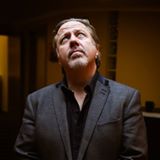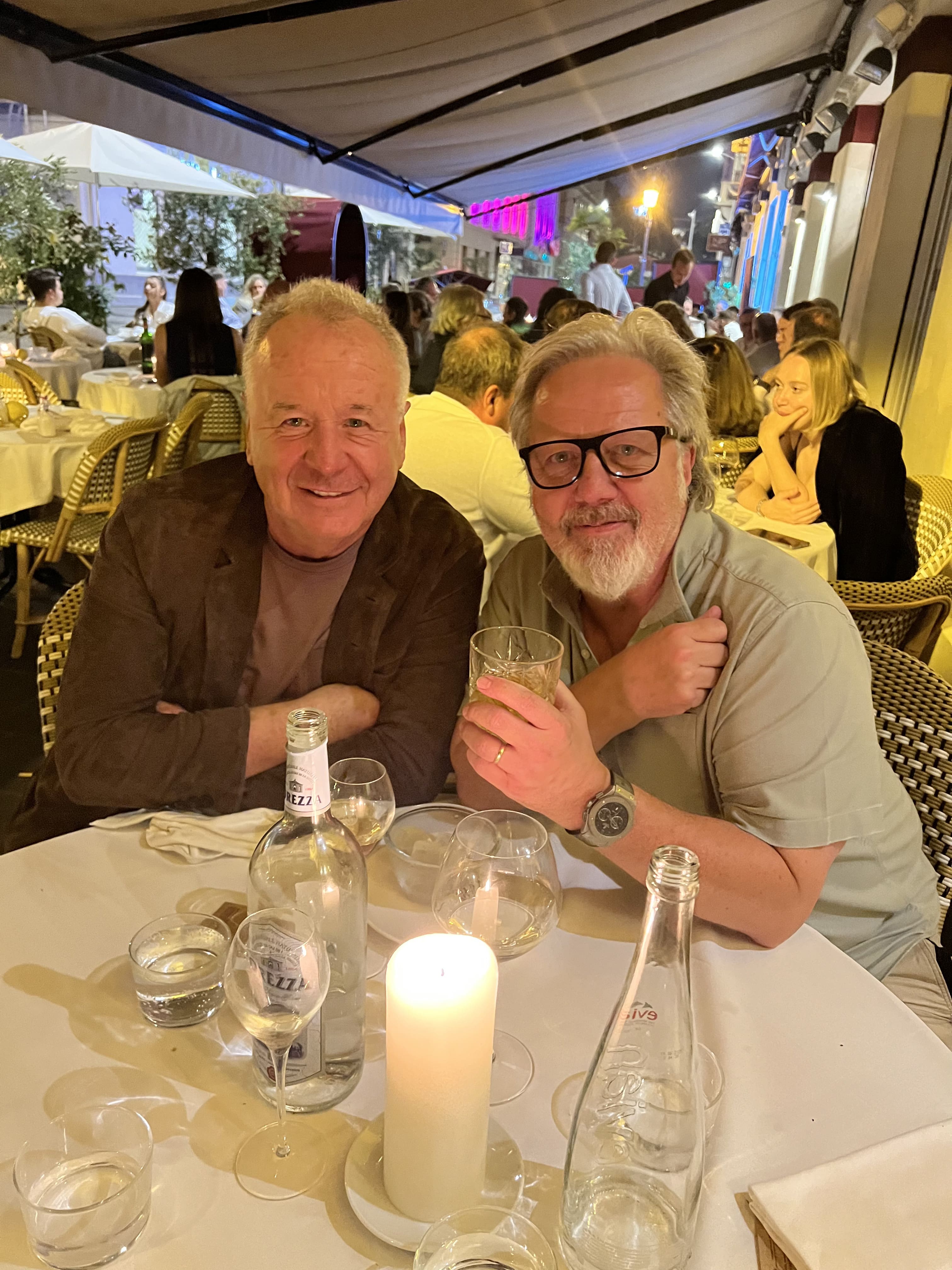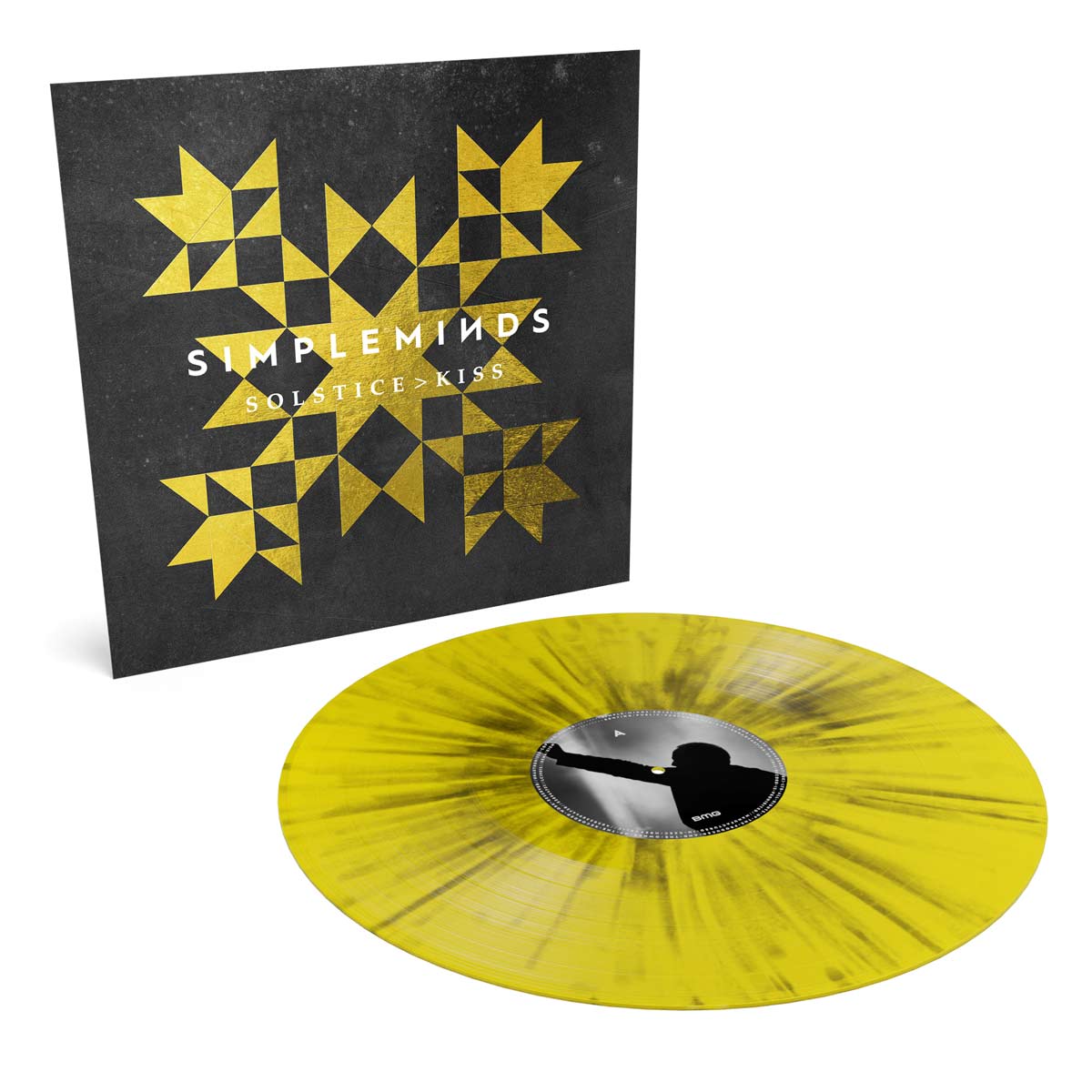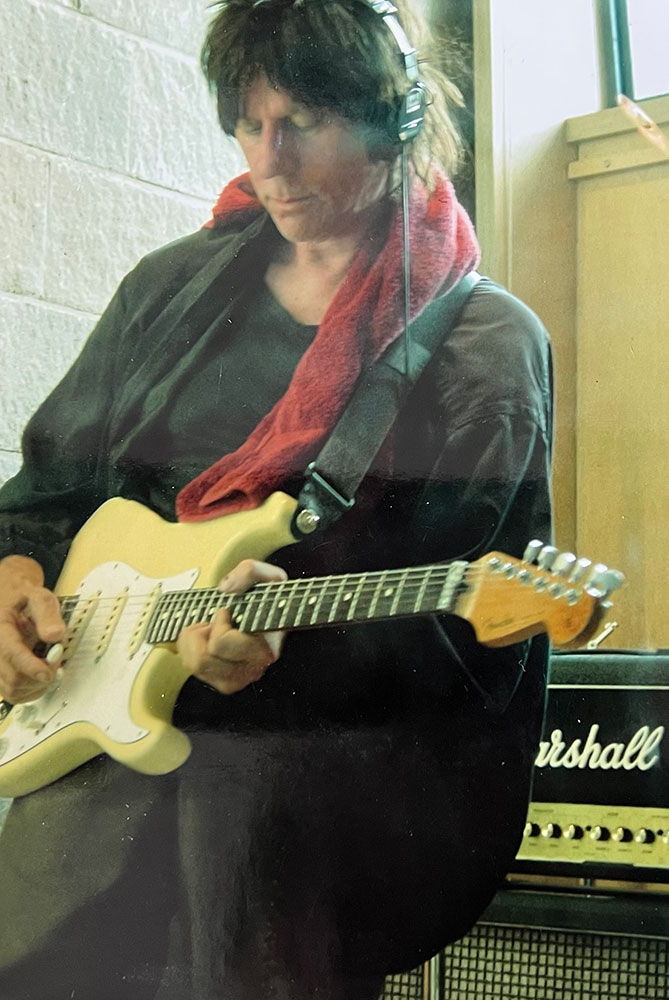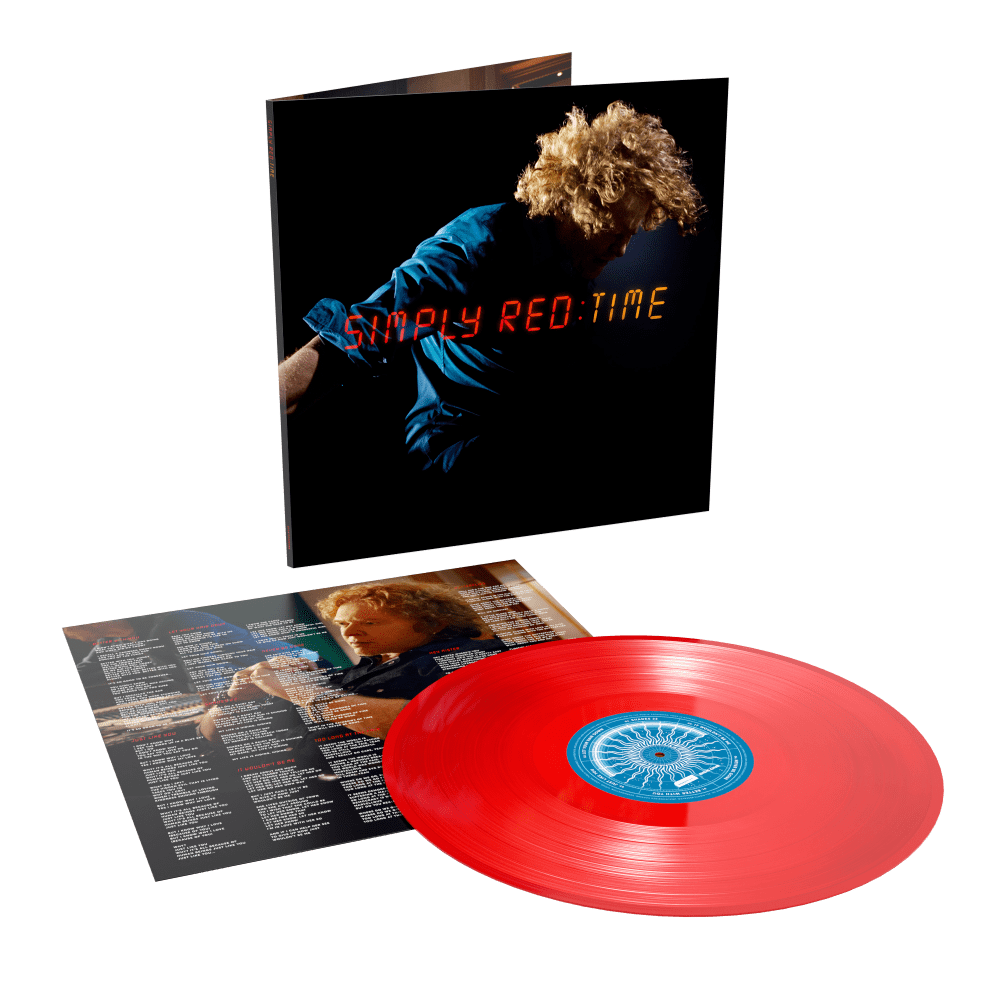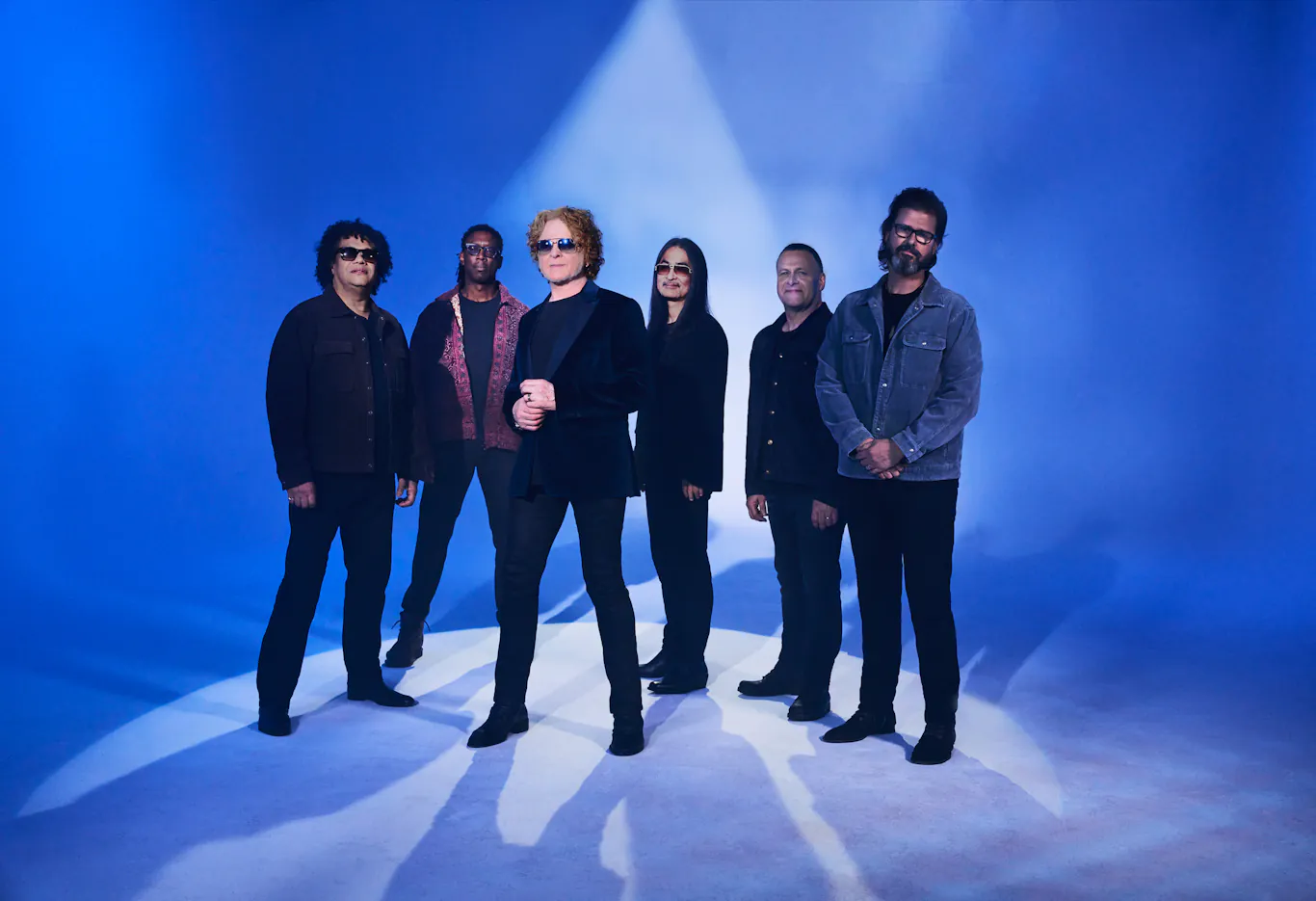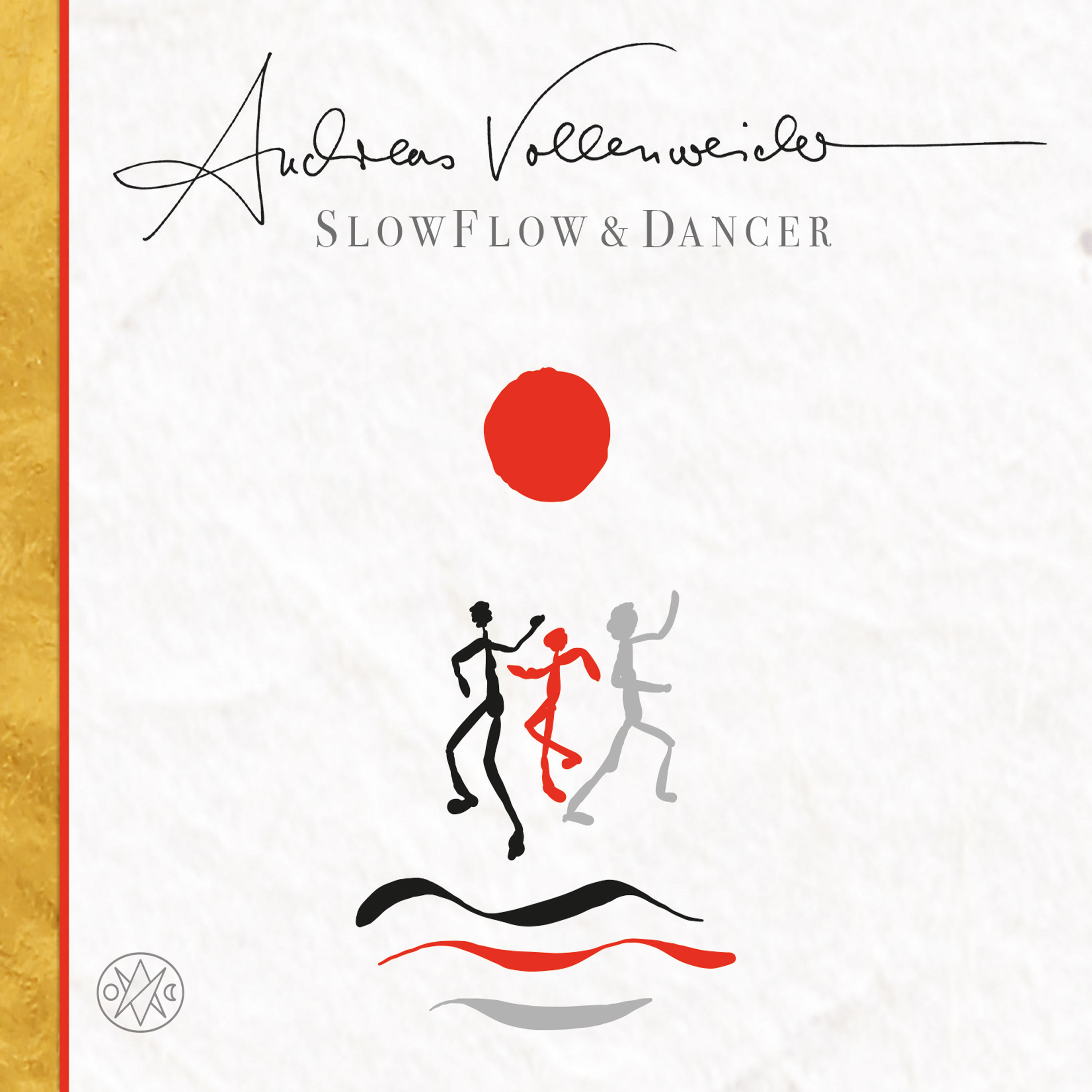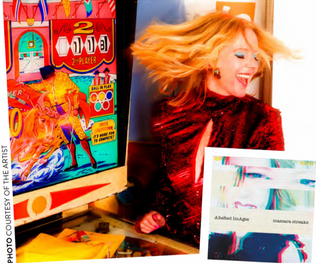Making 'Big Music' with Simple Minds
With the recent success of the album Big Music by Simple Minds, Andy talks about how the album was recorded and what it’s like working with a band whose reputation and substantial back catalogue precedes them…
Did you listen to early Simple Minds as a young man? Which track first made you sit up and take notice?
AW: Yes, I genuinely was a Simple Minds fan, and I still am. The first time I saw them was on Top of the Pops performing Promised You A Miracle which was on the 1982 album New Gold Dream. They were already five albums in by then, but I’d never heard of them. I wasn’t aware of the other stuff – that’s just how it was for me. I had a bit of a sheltered upbringing, not sheltered from Simple Minds in particular, but from anything resembling cool culture. My parents had me spending most of my time in church, so actually discovering rock music wasn’t that easy!
Anyway, I saw Promised You A Miracle on Top of the Pops, which coincidentally was the track that ended up being my introduction to Jim, because it was the song I recorded with him and Martha Wainwright for an Oxfam charity track. The first time we met we sat and chatted during the recording and got on very well. We really hit it off and because Jim’s a pro-active type of guy he wanted to see what it would be like recording together. I literally got a call a couple of days later from Ian, their manager, saying ‘Jim would like to do three or four tracks with you.’
That was the first time I actually spent any time with them in a studio, but I was aware of them much earlier than that. I remember when my first band, One AM, was put into the studio by MCA to do a couple of songs for a publishing deal. I distinctly recall this producer guy saying ‘the next big band are going to be The Minds.’ He referred to them as ‘The Minds’, which is what I always call them now.
So that was basically how Simple Minds first appeared on my radar. Today, New Gold Dream is still one of my all time favourite albums, it’s in my top ten. Every time I hear it, just the way that record sounds, it’s still great.
What’s weird about it, now that I’m friendly with the band and having been involved in their stuff, is hearing the multi-tracks for New Gold Dream. Charlie gave me them to listen to and it’s so strange when you put them up because you hear the sounds done with the Roland Jupiter 4 or Oberheim OBXA, which on the record have so much size and scope, but when you actually hear the sounds, they’re not big , they’re particular sounds that all work amazingly well together.
The process of recording the Big Music album took a while – demo-ing began in May 2009, it wasn’t completed until August 2014 – what took so long?
AW: It was odd really because the timetable for us started in 2010 and that was shortly after we met at the charity record session. When they got in touch first they said they wanted to do four tracks, one called Stagefright (which appeared on a best-of compilation) a track called In Every Heaven which hadn’t quite made the cut for New Gold Dream, and two tracks that eventually made the cut on Big Music (Broken Glass Park and Concrete and Cherry Blossom.)
With the initial four tracks the band didn’t seem to have any clear agenda, they weren’t sure if they were working towards an album or greatest hits, there wasn’t a fixed plan. As far as the tracks went, In Every Heaven was a sort of tribute to New Gold Dream, Stage Fright was one to add in to a greatest hits package and the other two were potentially for a new album.
We got on amazingly well with the guys and spent quite a lot of time with Charlie and Jim, and I think the results were good, but not fantastic. At the time, Gavin (Goldberg) and I were collaborating on co-productions and we hadn’t really found our feet together. The tracks were perhaps a bit more about me, than about him and I – and on reflection the ultimate success of the album Big Music from a production point of view, is a lot to do with me and Gavin actually hitting a very good point together in how we worked as a team.
But things didn’t go as well as you’d hoped?
AW: No, not initially. The reality of how things panned out at that time on the Big Music project, is that after those first four tracks, Jim and Charlie went off and worked with Steve Hillage, who had produced an earlier album of theirs – and they also worked on some other tracks with Steve Osborne.
It sounds like you were quite close to losing the gig at one point?
AW: We were really close, it hadn’t worked out – we were kind of fired in a way. But then I think because we got on so well with them as people, they gave us another shot. I think they were right to question it, because the first tracks we gave them weren’t that good – they were alright, but it took us some time to find our blueprint – and when we found it, we had the sound of the record. In the end it was a four way partnership between me, Gavin, Jim and Charlie, all the way through.
How do they come up with new material?
AW: I don’t think they have a set formula. Many of the tracks are initiated by Charlie who creates quirky but inspired backing tracks that Jim in turn creates concepts, lyrics and melodies against. Many of these songs were then jammed with the musicians (for example in Grouse Lodge, a residential recording studio in Ireland) and then delivered to us as multi-tracks which helped for the end result to a greater or lesser degree. Jim also wrote a few songs with new collaborators he met along the way.
Are there any stand-out tracks for you on the album?
AW: There’s a track called Honest Town which I loved right from the off. It’s one of two songs on the album that Jim co-wrote with Iain Cook from Chvrches. When I first heard it I emailed Jim to tell him what a brilliant song I thought it was. At that point we thought we’d lost the gig and the album was being worked on by other people, it turned out however, that they were struggling with that particular track. Jim remembered that I loved the song and he asked if we’d have a go with it.
So we had another go, we tried really hard and sent it back to them. They acknowledged we’d put a lot of work into it and it was clear we loved the song, but they still didn’t feel it was right.
Then, some time later I heard the version of Broken Glass Park on the radio that Steve Osborne had produced and I emailed Jim to say I thought it was a good version and that I really liked it. This, as it turned out, was well timed as Jim had dug out a copy of another track we did in 2010 and, with the distance of a couple of years, thought it checked a few of the boxes they were looking for. He contacted me again through Ian and suggested we tried another couple of tracks.
The first one he gave us was called Midnight Walking, which became something of a blueprint for us sonically throughout the rest of the album, and so from that point they continued to send us the record track by track until we had about eighteen in progress.
What’s it like working with Simple Minds?
AW: I can say unequivocally that working with those guys has been one of the most enjoyable experiences of my entire career. Not only are they talented and funny, they’re on fire with their work at the moment. They’ve had an incredible career and I totally rate them on every level.
Working with them in the studio there are no barriers or egos getting in the way, they completely value us and our input. In terms of working with them as people, there are four characters in the room when we’re together, usually, myself, Gavin, Jim and Charlie. Jim is like an overview guy, it has to feel right to him. When he’s listening to the tracks, he’s on stage and he’s seeing the audience in his mind’s eye and they’re rocking along to the tune, punching their fists in the air. When he gets that feeling, we’re winning.
They’re so famous for their big live performances, it must be quite a challenge when you’re in a studio in a controlled space thinking ‘How is this going to translate?’ But it sounds like Jim’s already thinking about that all the time.
AW: Exactly. This album is a huge success on that level. They’re really happy with the way the new songs are being received.
In the studio, Charlie is very much about cool and detail and contributes a lot of the unusual textures, as well as the guitars, of course. My role in the process is mainly in the form and concept so I’ll be thinking about how it will impact with their audience and whether the structure of the songs flow well enough. Gavin’s very much in the detail, responsible for the sound of those beats and the overall sound of the record mix-wise. Jim is all about how the song is coming over in its entirety. It’s a fabulous combo of four people.
Charlie’s guitars play a signature role in the SM sound. You’ve worked with a maestro in Jeff Beck, what did you learn from the way Charlie goes about his work?
AW: I enjoyed working with Charlie and actually worked in quite a similar way to how I worked with Jeff. What Charlie would often do is he’d deliver parts devised in rehearsal that were really good, or had been cut and edited out of other stuff. Charlie likes working on stuff at home, coming up with mad things all the time – little bubbles of sound that he offers to us. He’s the initiator of a lot of music from a compositional basis. But when we’re recording together, I just do the same as I did with Jeff, really. I try and set up open spaces of music for Charlie to play on, whether it’s the full duration of the song or just a passage. He’s really into effects and stuff, so he’ll play along with as much freedom as possible, and afterwards I’ll trawl through it and edit bits that make sense or are unusual.
The multi-tracks for the guitars originated in a lot of different ways. As I mentioned before, they like developing new material by jamming it out. At Grouse Lodge they tended to go in and jam for hours.
I’m not sure of the technical set ups they have in Ireland, but here in London, in the guitar sessions we did with Charlie, they varied. If they were on tour they’d have his rig there which is his big pedal-board with his whole set up. But very often he came in with his iRig and computer and played with that – which is probably disappointing news for tech-heads, because they’ll think it’s not a very pure way of doing it. That’s progress for you!
Charlie loves all his tech stuff, he’s really into it. So, the whole iRig thing, getting his Pro Tools up, plugging his guitar in through his computer, fiddling around with the rig on there, and then outputting even through a mini jack to us – he’s not afraid of that sort of stuff and of course, we’re not either. Occasionally we’d have the amp there and he’d play live stuff through that and plug his pedal-board into that. It’s a deceptively simple process – Charlie just plays cool, ambient stuff, he puts up these sounds and we record them. Afterwards, I edit it and that’s what we get at the end – we didn’t care about geeking out on the tech. In the end, it’s all about the songs.
It sounds like they don’t rely too much on fixed work modes and are still open to experimenting. They’ve been around so long you might think they had certain tricks that they go back to, themes they use, etc.
AW: No, they’re not on that page at all. The page they are on, is that they love, LOVE being in the band. They love playing live together, love touring – they’re touring all the time, it’s constant. They love making records and being in the band is everything to them. Of course, Jim and Charlie have been friends since they were little kids at school and now they’re in their mid-fifties – so they’ve been friends for forty-five, fifty years – they’re quite an item together in themselves, very close. When they get in the studio they are still excited by the possibilities – and I think because of the great results they’re getting at the moment and the positive reviews, they’re enjoying themselves more than ever.
A lot of the keyboards evoke some of their classic synth sounds. How difficult was that to get right? Can you emulate that with modern gear or do you have to use older stuff?
AW: It’s a combination, actually. Andy Gillespie played stuff down on all the jam sessions. He came up with a lot of really good keyboard parts and his wide knowledge of synths really helps. Then of course there’s my background as a keyboard player, too. It’s not a part of Gavin’s history, but nevertheless he’s mad for it, he loves all that. There are a lot of great plug-ins that we use for stuff like that, and we’ve still got some analogue synths, too.
Those sound-scapes are really strong – you just don’t hear that anywhere else right now. How do you get to that?
AW: It’s massively textural, a big sound. When we got towards the end of the project, remember we did eighteen songs, (well, we actually did twenty and we cut a couple out on the way), but they’re deep productions. It’s not like they only have five ingredients, they’re rich, complex arrangements with lots of keyboards and guitars. Oddly enough for someone with my background, you’d think I’d be more involved in the keyboards, but a lot of the time I was more involved working with Charlie on the guitars.
What about recording Jim’s vocals? How does he like to work?
AW: He works in various different ways. We recorded some takes as demo vocals that we intended to re-do, but didn’t, because Jim sings in a certain way and it’s usually pretty consistent and similar each time. His vocals are all about the character of what he does. It’s totally non-threatening working with Jim on vocals because he doesn’t put you under pressure like some singers do. He actually doesn’t mind doing anything. My usual technique for getting vocal performances is, ‘That was great, let’s do another’. With Jim, I’ll try and get him to do three or four takes then throw in some ideas, and do an edit.
But doing the vocals is so not a big issue, he doesn’t make a big deal out of it at all. There was no hushed moment where we said, ‘Right, it’s time for vocals now’. We inherited a lot of takes from the demos, which we kept because they were good. Of course, we dropped in on some stuff, modified it and chopped it around a little, where needed.
I tend to work on vocals as I’m going along these days, wherever possible. I’m making this sound like it was really easy, I think part of the reason why, is because it was. It was a huge volume of work, so from that point of view it wasn’t easy, but it wasn’t especially hard.
Were there any songs that you really struggled with?
AW: The tracks that caused problems only did so because we all thought they were great but weren’t quite nailed until we kept working and working on them. Human and Honest Town presented the most difficulties. With Honest Town we just kept laying down different versions, I myself recorded about three interpretations of that song. I remember one version I did that I thought Jim was going to love, it was like a Ryuichi Sakamoto, Forbidden Colours type thing, with piano and vocals. Jim came into the studio and I played it to him and he said ‘I really like that, but it’s not what I was thinking of .’ So, I put it aside and I thought, ‘Oh God, here we go again!’
A lot of the album is quite tight. With some SM songs they’re often longer and a bit more art rock, for want of a better term. Was it a conscious thing to make the tracks punchy and tight? It seems like it’s been a very positive thing, but is it difficult to achieve?
AW: It is something that I bring to the party, it’s one of my angles. The format of pop, keeping the format of the songs tight is a key part of my approach. In fairness to the band they don’t really think in those terms. Charlie’s pretty out-there as far as that’s concerned – he’s got his own sense of form, his own take, and it’s usually different, more open ended.
One of my strengths is that because I’ve been working on pop records all my career, I understand the format inside out. We debated several edits with Jim along the way, you know, putting forward the view that certain sections should be half as long, for example. Jim would come back with; ‘I like the edit, but I still think that second chorus should be twice as long’ – you know how it goes. You win some, lose some!
Big Music is a double album with bonus tracks, was it difficult deciding which songs made the final cut? Was there a lot of material to select from?
AW: Yes, there were more songs than actually ended up on the album. The guys had a lot of other material floating around that they didn’t include. What was interesting was that the idea of it being a long, deluxe double album evolved over time – it didn’t start out that way – we weren’t consciously collecting pieces. The problem was that the boys didn’t really want to lose anything, they loved everything and the main issue was not ‘What’s on the eighteen song deluxe version?’, it was ‘What makes the final twelve?’ And every time we came up with another song, we’d go – ‘Mmm – I think that’s for the first disc, isn’t it?’ And there would be this inevitable discussion, because there were one or two moments where Charlie wouldn’t have put something on the first disc, but put them on the second because he thought they were slightly less cool. However, every time there was one that we thought ‘That’s a single’ – which we did think a lot, actually; they’d have to be on the first disc.
I am one for album formatting and stuff, I’ve done a lot of it. But Jim really gets into that side of things and he really took that job on and enjoyed it. I got emails from him all the time saying ‘I’ve got a great running order for the album, Andy, try this.’ I think it’s something that he muses about in his private time, you know he dreams of the set and the running order. There was a debate about what the opening song would be, instead of Blindfolded, Gavin wanted it to be the title track, Big Music. But I actually like the opening of the record, I liked Jim’s concept, and when you listen to it with those first four songs going BANG BANG BANG BANG, one after the other, strong 4/4 electro, clubby beats along with really big sounding rock songs, it’s great!
What’s the story behind the ‘Riders On The Storm’ cover?
AW: Yeah, it was the last song that we did of the whole album. It was the final moment, like that last day of school when you take your games in. Jim had phoned me up and said ‘We did this song live. Sort of accidentally live as a jam’ and he really wanted to do it. Simon Heywood (who does an electro set with Jim and Charlie), put together the original arrangement which I took on and developed. There was no real back story about choosing that particular song, it just kind of rocked. I did the guitars on Riders On The Storm very much like a Jeff Beck edit, if you listen you’ll hear the way the parts chip all the way through, because Charlie just played tons of mad stuff all over it.
And then the other thing was, that historically, Peter Vettese had worked with the band on an album with Steve Lipson. Peter is a sublime keyboard player, so Jim really wanted to get him in to do his thing. Up until that point there weren’t any guest musicians at all on the album, just me, Gavin, Jim and Charlie working on the record with parts we’d either inherited from the band or writers, and stuff that we had all contributed. So it was a fun session that we did together and it was really great. We got a Wurly in and Peter came in and I ended up editing between Peter Vettese and Charlie. Because this track came in so late and we had to deliver the album, we could have done with a bit more time to nail the definitive mix, but I like the madness of the end result.
A lot of current music is very pared down, acoustic, singer-songwriter type stuff –Simple Minds are racing in the other direction. Recording Big Music, with its epic, multi-layered sound-scapes – were you consciously bucking the trend?
AW: The thing about The Minds is that they’ve always had size. They’re a stadium band. I mentioned earlier about the various versions of Honest Town we tried. One of Jim’s main comments about my Ryuichi Sakamoto take on Honest Town was that he missed having the loud, sequenced section at the beginning of the song belting out from the PA – that’s how he envisaged it. That re-confirmed to me that a big sound is where they’re at – it’s what works for them.
Funnily enough, we’re embarking on an acoustic album as one of the next projects. I’m not sure if that’s a scoop or not – the fans know about it, I think. We’ve already put some time into thinking about material that might work on that record – getting that big sound on an acoustic album will be an interesting challenge.
The band still enjoy an elevated cool rating, for want of a better term – with acts like The Killers recording Don’t You Forget About Me, and Iain Cook from Scottish hipsters, Chvrches co-writing – what do you think makes them such an enduring band, what keeps them cool with people?
AW: They’d be the first to admit they felt out in the wilderness for a while, but they always were considered cool. Some of their biggest, most successful material was probably seen as a sell-out by certain sections of the fan-base, but that’s something you’ll always get. They have such a wealth of material they can almost do anything. They did a tour called 5 x 5 at places like The Roundhouse and other venues around the 2000 seat capacity. In these shows they performed five songs from each of the first five albums. So, songs from Life In A Day, Real to Real Cacophony, Empires and Dance, New Gold Dream and Sons and Fascination, all the early stuff, plus some bonus tracks. Obviously, it didn’t have Don’t You Forget About Me or Alive and Kicking which came later– but for all the fans right from the early days, the ones that thought of the band as the coolest thing ever, that was the tour for them, and they absolutely loved it.
Incredible to think they can just take the first five albums and speak directly to a whole audience from that time.
AW: They became more of a mainstream act and made that switch from edgy art rockers to a stadium band. The song Waterfront was like an incredible, stadium rock anthem that just used to light up an arena in a massive way. But they’ve succeeded in holding on to their credentials pretty well. Anyone who has met them will tell you they’re incredibly cool, kind people, not rock star-ish. They still love music and I think that really comes across in what they’re doing right now. Their passion keeps things fresh and gives it an edge still after all this time. It makes me really curious what we’re going to do next…

